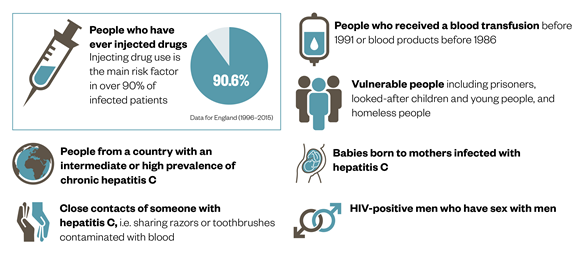Hepatitis C Treatment in Bulgaria
Search and Compare the Best Clinics and Doctors at the Lowest Prices for Hepatitis C Treatment in Bulgaria

Find the best clinics for Hepatitis C Treatment in Bulgaria
No clinics available
Turkey offers the best prices Worldwide
Price: $ 22,731

- Home
- Bulgaria
WHY US?
At Medijump, we're making medical easy. You can search, compare, discuss, and book your medical all in one place. We open the door to the best medical providers worldwide, saving you time and energy along the way, and it's all for FREE, no hidden fees, and no price markups guaranteed. So what are you waiting for?

Free

Best Price

Widest Selection

Risk-Free
What you need to know about Hepatitis C Treatment in Bulgaria

Hepatitis C is a viral infection that can cause liver inflammation and lead to serious liver damage. If you have hepatitis C, your doctor will examine your specific condition and make a treatment plan based on the type of the hepatitis C (genotypes), your general condition, and how much liver scarring (cirrhosis) you have.
What does a Hepatitis C Treatment Procedure Involve?
The main treatment options for hepatitis C are antiviral medication and liver transplantation. Antiviral medication is used to clear the virus from your body in at least 8 to 12 weeks. If you have developed a more serious complication, then liver transplantation can be an option. During liver transplantation, you are given a general anesthetic, and then your doctor removes the damaged liver and replaces it with a healthy liver, either from a deceased donor or a living donor.
How Long Should I Stay in Bulgaria for a Hepatitis C Treatment Procedure?
If your doctor gives you antiviral medication, you may need to stay in Bulgaria for a few weeks as your doctor needs to monitor how your body is responding to the medication. If you undergo surgery, you are required to spend 5 to 10 days in the hospital and stay in the country for 10 to 14 more days after you are discharged from the hospital.
What's the Recovery Time for Hepatitis C Treatment Procedures in Bulgaria?
The recovery time depends on which treatment you underwent. With antiviral medication, you should be able to get back to most of your normal routine within a couple of days or as soon as you do not experience any symptoms or side effects from the medication. With a liver transplant, the full recovery period can take around six months, but you should be able to return to work within 12 weeks.
What sort of Aftercare is Required for Hepatitis C Treatment Procedures in Bulgaria?
Making healthy lifestyle changes is very important after your treatment, such as following a healthy and balanced diet plan and regular exercise. Treatment with antiviral medication requires regular follow-up checkups to monitor your condition and progress. With liver transplantation, you also need regular checkup and you may need to take medication for a longer period of time.
What's the Success Rate of Hepatitis C Treatment Procedures in Bulgaria?
Antiviral medicine is a safe and effective treatment for hepatitis C, with around 90% of patients with the condition are cured. Liver transplant is generally safe and approximately 70% of patients who undergo the procedure can live for ten years or longer. Both have some side effects and risks, such as depression, anxiety, skin irritation, insomnia, anorexia, tiredness, hair loss, aggressive behavior, bile duct complications, blood clots, bleeding, failure or rejection of donated liver, infection, mental confusion, and seizures
Are there Alternatives to Hepatitis C Treatment Procedures in Bulgaria?
You will need antiviral medication to treat hepatitis C, but if the infection is diagnosed in the early stages, you may not need treatment immediately. However, you still need to make lifestyle adjustments. Your doctor will have several blood tests to see if your body fights off the virus, if the infection does not continue, you usually do not need treatment.
What Should You Expect Before and After the Procedure
When you have hepatitis C, the virus can damage your liver and you may experience symptoms, such as fatigue, bruising easily, bleeding easily, jaundice, weight loss, dark-colored urine, and more. After treatment, you may be cured and will not experience any of these symptoms anymore.
Whilst the information presented here has been accurately sourced and verified by a medical professional for its accuracy, it is still advised to consult with your doctor before pursuing a medical treatment at one of the listed medical providers
No Time?
Tell us what you're looking for and we'll reachout to the top clinics all at once
Enquire Now

Popular Procedures in Bulgaria
Prices Start From $50

Prices Start From $35,013

Prices Start From $39

Recommended Medical Centers in Bulgaria for procedures similar to Hepatitis C Treatment

- Interpreter services
- Translation service
- Religious facilities
- Medical records transfer
- Medical travel insurance
- Health insurance coordination
- TV in the room
- Safe in the room
- Phone in the room
- Private rooms for patients available

- Interpreter services
- Translation service
- Religious facilities
- Medical records transfer
- Medical travel insurance
- Health insurance coordination
- TV in the room
- Safe in the room
- Phone in the room
- Private rooms for patients available

- Interpreter services
- Translation service
- Religious facilities
- Medical records transfer
- Medical travel insurance
- Health insurance coordination
- TV in the room
- Safe in the room
- Phone in the room
- Private rooms for patients available

- Interpreter services
- Translation service
- Religious facilities
- Medical records transfer
- Medical travel insurance
- Health insurance coordination
- TV in the room
- Safe in the room
- Phone in the room
- Private rooms for patients available

- Interpreter services
- Translation service
- Religious facilities
- Medical records transfer
- Medical travel insurance
- Health insurance coordination
- TV in the room
- Safe in the room
- Phone in the room
- Private rooms for patients available

- Interpreter services
- Translation service
- Religious facilities
- Medical records transfer
- Medical travel insurance
- Health insurance coordination
- TV in the room
- Safe in the room
- Phone in the room
- Private rooms for patients available

- Interpreter services
- Translation service
- Religious facilities
- Medical records transfer
- Medical travel insurance
- Health insurance coordination
- TV in the room
- Safe in the room
- Phone in the room
- Private rooms for patients available

- Interpreter services
- Translation service
- Religious facilities
- Medical records transfer
- Medical travel insurance
- Health insurance coordination
- TV in the room
- Safe in the room
- Phone in the room
- Private rooms for patients available

- Interpreter services
- Translation service
- Religious facilities
- Medical records transfer
- Medical travel insurance
- Health insurance coordination
- TV in the room
- Safe in the room
- Phone in the room
- Private rooms for patients available

- Interpreter services
- Translation service
- Religious facilities
- Medical records transfer
- Medical travel insurance
- Health insurance coordination
- TV in the room
- Safe in the room
- Phone in the room
- Private rooms for patients available
Hepatitis C Treatment in and around Bulgaria
Introduction
Bulgaria has plenty to offer and tourists are going to be very impressed with the country’s mountainous landscapes, beautiful Black Sea beaches, fascinating history, friendly locals, lively nightlife, and affordability. Although the country’s holiday tourism is very much on the radar, it is also actually quite popular with medical tourists, due to its modern medical centers, highly trained medical professionals, state-of-the-art equipment, affordable healthcare, and mineral baths, thousands of medical tourists visit this country each year. Most of the medical tourists come for dental treatment, orthopedic surgery, elective surgery, neurosurgery, as well as health screening.
Popular Cities and Regions in Bulgaria
Bulgaria’s laid-back capital city, Sofia, is truly a must-visit. It is full of museums, Ottoman mosques, communist architecture, chic galleries, Eastern Orthodox churches, amazing restaurants, and upbeat clubs. One of the most popular landmarks in the country is the Aleksander Nevski Cathedral, which is an awe-inspiring church built between 1882 and 1912 to honor 200,000 Russian soldiers who died fighting for the independence of Bulgaria during the Russo-Turkish war. If you want to relax on beautiful beaches visit Varna, which is a major tourist destination during the summer. The second-largest, city in Bulgaria is Plovdiv and it is one of the oldest continuously inhabited cities in Europe. Tourists are attracted by the Roman Amphitheatre, Archeological Museum, and Tsar Simeon Central Garden.
Transport in Bulgaria
Most international tourists will arrive at Sofia Airport, which serves flights to most numerous major cities in Europe and the Middle East. There are several budget airlines that operate flights from this airport, including Ryanair and Wizz Air. Domestic flights are available, but they tend to be expensive. Therefore, to travel from one city to another, trains and buses are the best option. Buses and trains are punctual and affordable. However, if you are in a hurry, you should avoid trains as they can be a little slow. To travel around big cities, taxis are widely available and are really cheap. Just make sure you choose a licensed taxi to avoid being overcharged.
Visas in Bulgaria
While Bulgaria is not yet a part of the Schengen Area, it has a visa policy that is based on the Schengen system. Therefore, holders of Schengen Visa are allowed to enter the country. Additionally, citizens of 62 countries, including the US, Australia, and the UAE, can stay in the country for up to 90 days without a visa.
Weather in Bulgaria
From June to August, Bulgaria experiences summer. The weather can get a bit hot and humid, with an average temperature of 19°C to 21°C. July is the wettest month in the country. Winter, from December to February, is usually freezing. Autumn and Spring bring pleasant weather.
Additional Info
- Local Currency: The official currency is the Bulgarian Lev (BGN). 1 USD will get you approx. 1.8 BGN.
- Money & Payments: You can find ATMs in every city in the country. Credit cards are accepted in bigger restaurants and hotels. Tipping is sometimes expected.
- Local Language: Bulgarian is the official language in Bulgaria. Turkish and Roma are spoken by a minority of people. English is becoming more and more common in the country, but it is not widely spoken.
- Local Culture and Religion: Christianity dominates the population of Bulgaria, followed by Islam and Judaism.
- Public holidays: Bulgaria celebrates several historical and religious holidays, such as Orthodox Good Friday, Orthodox Easter Day, Independence Day, Culture and Literacy Day, Christmas Day, and Liberation Day.
Popular Searches
- Plastic Surgery in Thailand
- Dental Implants in Thailand
- Hair Transplant in Thailand
- Breast Augmentation Thailand
- Gastric Sleeve in Thailand
- Gender Reassignment Surgery in Thailand
- Laser Hair Removal in Bangkok
- Botox in Bangkok
- Dermatology in Bangkok
- Breast Augmentation in Bangkok
- Coolsculpting in Bangkok
- Veneers in Turkey
- Hair Transplant in Turkey
- Rhinoplasty in Turkey
- Stem Cell Therapy in Mexico
- Rhinoplasty in Mexico
- Liposuction in Mexico
- Coolsculpting in Tijuana
- Rhinoplasty in Korea
- Scar Removal in Korea
- Gastric Sleeve in Turkey
- Bone Marrow Transplant in India
- Invisalign in Malaysia
- Plastic Surgery in the Dominican Republic
- Tummy Tuck in the Dominican Republic
- Plastic and Cosmetic Surgery in Poland
- Rhinoplasty in Poland
- Hair Implant in Poland
- Dental Implants in Poland
- IVF in Turkey